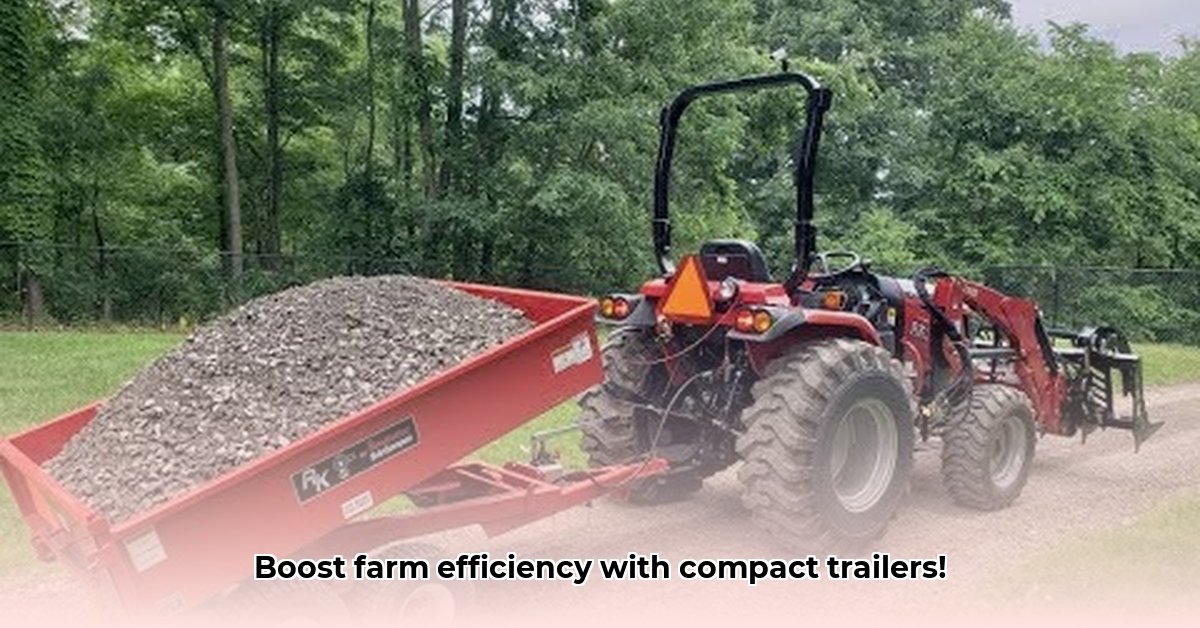
Compact Tractor Dump Trailers: Your Ticket to a More Efficient Farm
Boosting farm efficiency requires smart choices, and investing in a compact tractor dump trailer is a game-changer. These versatile machines significantly reduce the time spent hauling materials, from gravel to fertilizer, allowing you to focus on crop production. However, navigating the diverse options available can be challenging. This guide simplifies the process, helping you make an informed decision. For more information on compact tractors, check out this helpful resource: Compact Tractor Info.
Finding Your Perfect Compact Tractor Dump Trailer Match
Selecting the right compact tractor dump trailer is crucial. Farm size, terrain, and typical hauling materials significantly influence your choice.
1. Assessing Your Needs:
- Small-Scale Farms: Smaller farms typically require trailers with lower capacities (under 1.5 tons), offering better maneuverability and lower costs.
- Larger Operations: Larger farms benefit from higher-capacity trailers (4,000-14,000 lbs or more), reducing the number of trips needed and increasing overall productivity. This initial higher cost leads to long-term efficiencies.
2. Navigating Terrain:
- Flat Land: On flat land, simpler trailer designs suffice.
- Rough Terrain: Uneven terrain necessitates rugged designs with high ground clearance to avoid getting stuck.
3. Hydraulic System Considerations:
- Manual Dumping: Manual dumping is cheaper but requires more physical effort. Suitable for smaller trailers and infrequent use.
- Tractor-Powered Dumping: Tractor-powered systems enhance convenience and reduce physical strain, despite higher initial costs. This is a worthwhile investment for frequent heavy hauling.
4. Enhancing Functionality and Safety:
Several features enhance both functionality and safety:
| Feature | Benefits | Considerations |
|---|---|---|
| Sideboards | Secure loads and prevent spills. | May hinder dumping in tight spaces. |
| Tailgate | Simplifies unloading. | Ensure durability for frequent use. |
| Heavy-Duty Tires | Improved grip on uneven terrain; reduced slippage. | Higher initial cost but potentially increased longevity. |
| Lights & Reflectors | Enhanced visibility, especially at dawn/dusk, improving safety. | Essential for safe operation on public roads. |
5. Your Pre-Purchase Checklist:
Before purchasing, consider:
- Budget: Include purchase price, maintenance, fuel consumption, and potential repairs. Obtain multiple dealer quotes.
- Materials Handled: Different materials (soil, gravel, compost) require different trailer features; loose materials versus denser ones have varied needs.
- Farm Size & Terrain: This determines the necessary trailer size and maneuverability. A mismatch can lead to inefficiencies.
The Environmental Impact: Sustainable Practices
Sustainable farming prioritizes minimizing environmental impact. Your trailer choice plays a significant role:
- Sustainable Materials: Opt for trailers made from recycled or sustainable materials whenever available.
- Fuel Efficiency: Prioritize fuel-efficient designs and driving practices. Consistent speeds and avoiding harsh acceleration/braking reduce fuel consumption and CO2 emissions. Exploring alternative fuels (biodiesel) is also environmentally beneficial.
- Soil Health: Avoid overloading to minimize soil compaction.
- End-of-Life Considerations: Inquire about recyclability or proper disposal options at the end of the trailer's lifespan.
Safety First: Responsible Operation
Prioritize safety through responsible operation:
- Secure Attachment: Ensure the trailer is correctly attached to your tractor before movement.
- Even Weight Distribution: Distribute the load evenly to prevent tipping; avoid overloading.
- Manufacturer Instructions: Adhere strictly to manufacturer's instructions and safe operating procedures.
- Regular Inspections: Regularly inspect the trailer for wear and tear and address any issues promptly.
- Smart Loading: Avoid overloading to prevent damage and accidents.
By considering these factors, you can select a compact tractor dump trailer that optimizes farm efficiency, sustainability, and safety. This investment yields long-term benefits for your operation.
How to Reduce Environmental Impact of Hydraulic Dump Trailers in Sustainable Farming
Key Takeaways:
- Optimizing trailer selection and usage is key to minimizing environmental impact.
- Efficient operations, sustainable materials, and responsible disposal are essential for sustainable farming practices.
- Collaboration between farmers, manufacturers, and regulators fosters improved sustainable practices.
Minimizing Environmental Impact:
- Right-Sizing: Choose a trailer appropriately sized for your operation to avoid overcapacity and unnecessary fuel consumption.
- Efficient Operations: Plan routes effectively and ensure full loads to minimize trips. Regular maintenance enhances fuel efficiency.
- Fuel Efficiency: Employ fuel-efficient driving techniques and explore alternative fuels.
- Sustainable Materials and Disposal: Prioritize trailers made from recycled materials and ensure proper disposal at end-of-life.
- Preventative Maintenance: Regular maintenance reduces fuel consumption and extends trailer lifespan, minimizing environmental impact.
- Regulatory Compliance: Adhere to all local regulations regarding waste disposal and transportation.
- Partnerships: Collaboration amongst stakeholders—farmers, manufacturers, and waste management companies—is crucial for developing sustainable practices.